How to Teach Digital Marketing
Introduction: Why Rethink How You Teach Marketing
In the last 20 years, there's been a fundamental shift in the way that people live, shop and buy.
Consider:
People used to work in their office from 9-5. Now they can work whenever they want, wherever they want.
Folks used to drive to big box stores and malls to make purchases. Now they shop online.
People used to read their mail, they watched one of seven television channels, and they got their news from newspapers.
Few areas of business have been disrupted by this shift more than marketing.
Simply put, technology broke the traditional marketing playbook. Caller ID blocks cold calls, DVR makes TV advertising less effective, and spam filters block mass emails. It's still possible to get a message out using these channels, but it costs a lot more, and it's increasingly less effective.
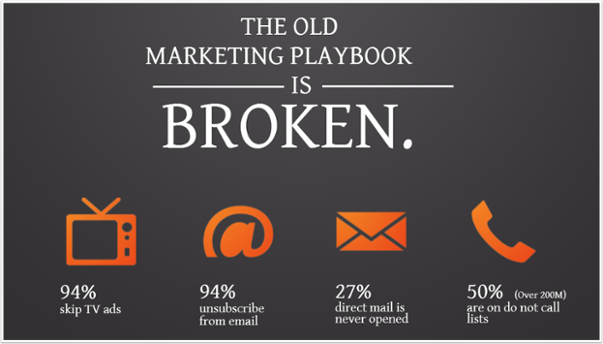
This new landscape requires an updated marketing playbook.
A series of recent studies has uncovered that marketers struggling to adapt to this new paradigm.
A 2013 study by Online Marketing Institute on the state of digital marketing talent found a significant gap between the skills applicants need and the abilities of their current team.
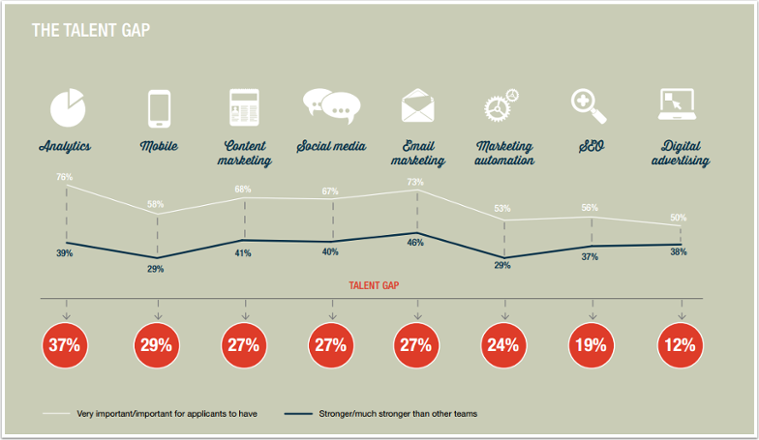
Furthermore, a joint study by Google and Boston Consulting Group found that marketers themselves admit to a shortcoming in digital marketing capabilities.
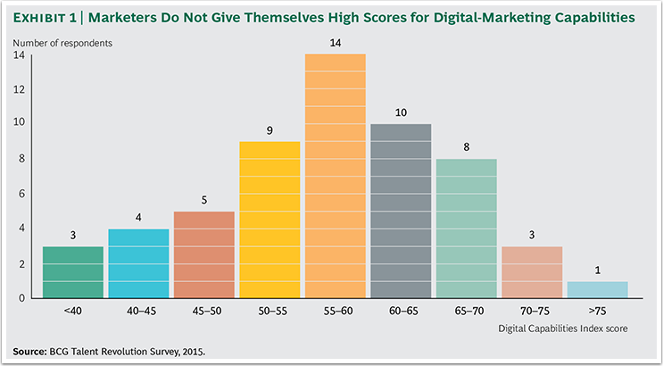
Without getting into a larger conversation about the mandate of higher education, if you, as a professor, care about your students' future success, this is both a cause for concern...and an opportunity to set your students up with a set of marketing skills that matches the way the world lives, works, and shops.
In a landscape that changes so quickly, how can you make sure you provide students with a relevant, meaningful and effective digital marketing education? That is what this guide is all about.
ABOUT THIS GUIDE
This guide, and it's accompanying resources, were created with guidance and assistance from HubSpot's Education Partners. These college and university professors are rethinking the way marketing is taught in higher education.
A great digital marketing course must:
- Be interdisciplinary
- Combine theory and practice
- Provide proper business context
- Center around applied learning
- Adapt to a rapidly changing landscape
All of this starts with your syllabus.
Ready to put these ideas in action?
Apply for HubSpot's Education Partner Program and join 1,500+ other professors reinventing their curriculum.
How to Create a Digital Marketing Syllabus
THE IMPORTANCE OF A SYLLABUS
A successful semester starts with the syllabus. It's an opportunity to get students and faculty on the same page, to express the value of the course, and to set learning expectations for students.
Consider the syllabus your students' roadmap to success. What signs can you give them along the way? A well-crafted syllabus forces the teacher to ask themselves a larger question: “What should I teach in my digital marketing course?”
Often, university-level digital marketing courses lack narrative. They cram together as many buzzwords, trends, and TLAs (three letter acronyms like SEO and PPC) as possible, all under the umbrella of digital marketing, internet marketing, or e-marketing. It’s enough to make your head spin. As your university’s program develops, you’ll have the opportunity to branch out into all-encompassing digital marketing concentrations, minors, and even majors. For an individual course, you'll have to focus.
In a field that changes as quickly as digital marketing does, the syllabus will become your home base — a resources you can continue to improve and refine over time.
Working with professors in HubSpot's Education Partner Program, we’ve highlighted five components of a strong digital marketing syllabus:
- Course overview: How you contextualize your course.
- Learning outcomes and objectives: What your students will learn, and why they'll learn it.
- Course delivery (pedagogy): How you will teach the course.
- Software: The combination of theory and practice.
- Required reading and viewing: The content your students will learn.
Not ready to get the template? Keep reading for more details on building a syllabus.
COURSE OVERVIEW
A syllabus overview is the description, justification, and purpose of your course. Often, it will be a similar yet expanded version of the description you used to promote the course. Here's what to consider when creating an overview for your digital marketing syllabus:
- Build a tight focus. Will your course focus on B2B, B2C, or both? What will the central narrative be? Social media, analytics, content? The narrative of your syllabus will be important, especially if you’re creating a survey digital marketing course that covers the topic broadly.
- Context is critical: Most students don’t have much knowledge of B2B funnel marketing. Their experience with digital marketing will be almost entirely with B2C and app-based companies like Uber and Airbnb. Keep things exciting, engaging, and human.
- Avoid jargon: Remember that for many students this will be their first exposure to many of these concepts.
Looking for a digital marketing course overview example?
LEARNING OUTCOMES AND OBJECTIVES
Learning objectives are brief, clear, and specific statements defining what a student should be able to do at the end of the course.
The learning outcomes in a college-level digital marketing course should, of course, be outcome-driven. Many students take these courses because they teach in-demand skills. So, ask yourself, "Are the learning outcomes of this course setting up my students for success?" Digital marketing changes quickly, so make sure your objectives sync with the skills and abilities the industry looks for in new hires.
It can be tempting to cram many types of software and competencies into your syllabus — avoid doing that. Rather, consider consolidating different channels and methods within an underlying skill. Instead of "demonstrate competency using Facebook, LinkedIn, and Twitter," try "evaluate the efficacy of different social media channels" or "formulate a social media strategy for a business." Those learning outcomes stand the test of time by focusing on baseline skills through the lens of popular channels, but they prevent you from having to update the core of your syllabus and course every semester.
Here are some other things to consider:
- Focus on behavior. What specific activities will students be able to do? Analyze digital trends? Conduct an SEO audit? Create a digital strategy? Action-based outcomes provide clear direction to students on what you expect.
- Think of your most successful students. Consider your best student, or if you haven't taught digital marketing before, your ideal student. Which concepts would they use to evaluate and create digital marketing strategies? What best practices would they use?
- Use Bloom's Taxonomy. Bloom's Taxonomy refers to a set of hierarchical models used to classify learning outcomes into levels of complexity. It spans cognitive functions, from remembering to creating. The verbs in the image — copied from the taxonomy, which was updated in 2001 — are a great framework for thinking about your digital marketing course objectives.
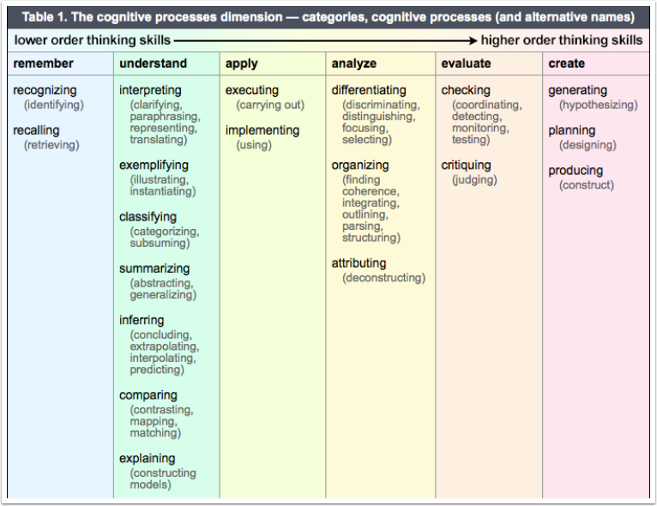
COURSE DELIVERY
As a college professor who teaches digital marketing, one of the most important decisions you must make is how to deliver the course. Many of HubSpot’s Education Partners have adopted the flipped classroom as their preferred approach to teaching digital marketing.
The flipped classroom is an instructional strategy that reverses the traditional way of teaching. Content that has been traditionally delivered as lectures or viewings is consumed outside the classroom as homework, and activities traditionally used for homework (worksheets, assignments, etc.) are now done in class.
Moving lectures and readings outside the classroom and bringing in assignments and problem sets works for a few reasons:
- The class is centered around the learner, not the teacher.
- Learning more closely mirrors how work gets done in business.
- It's a more constructive way to blend theory and application.
- It’s easier to integrate open resources and industry experts — securing top executives and marketing managers to visit your class in person is not easy. It’s much easier, however, to curate their best content from the web, have your students consume it at their own pace, and then work together to apply what they’ve learned to a situation.
Poor learning arises from traditional un-engaging lectures. A growth in high-quality online education and the increasing importance of collaborative use of software means a flipped classroom approach is an excellent option for designing a university-level digital marketing syllabus.
USING SOFTWARE TO BLEND STRATEGY AND EXECUTION
Any great digital marketing course combines theory and practice. But another way to consider this is the synthesis of strategy and execution. When it comes to digital marketing, execution is inexorably linked to the software marketers use. And when it comes to marketing software, the options can be overwhelming.
In order to expose students to a rough approximation of their future working environment, professors often try to cram multiple different solutions into one course, using social media software, analytics software, video creation software, project management software, content management software, email marketing software... It’s enough to make your head spin.
Can you imagine how your students feel? First they're expected to integrate digital marketing strategies into the existing frameworks they've learned in their introductory courses. Then, in these upper-level capstone or practicum courses, they're asked to apply those myriad frameworks and strategies to run a business. On top of that, they're asked to learn up to 10 different software applications with 10 different user interfaces, 10 places to get help, in 10 dashboards that don’t share data. What a headache.
Increasingly, digital marketing professors are turning to marketing and sales platforms to do much of the heavy lifting, looking for software that can combine the functionality of different solutions (email, SEO, social media, content marketing, analytics, etc.) into one platform.
As you design your syllabus, put yourself in your students' shoes and consider where you'd like them to spend their time: on navigating the help documentation, logins, and functionality of disparate, decentralized point solutions, or focusing on the blending of theory and practice and strategy and execution of business growth.
REQUIRED READINGS AND VIEWINGS
Regardless of whether or not you embrace the flipped classroom approach in your syllabus, you’ll need strong, industry-approved resources. Why industry-approved?
Collaborating with the industries that will employ your students in the future is a great way to ensure your students graduate with a competitive advantage in the job market. It’s an excellent way to make sure what you're teaching is equipping your students with the skills they need to be successful.
Second, digital marketing is evolving at a lightning pace, and it can be difficult to keep up. By the time a textbook has been written, reviewed, and published, the content can already be out-of-date. But there's a tenuous balance between staying current and chasing trends. There’s a big difference between teaching students how to evaluate the efficacy of different social media channels and understanding the swiftly changing best practices, case studies, and market players of, say, live and ephemeral media like Snapchat, Instagram, and Facebook live. Industry can be a valuable supplement in this endeavor.
You, as the professor, must drive the ship. Industry is a compass you can use to course-correct so you can spend time working on what matters.
Here are a few places to find industry-leading content that's trusted, accurate, and up-to-date:
- Blogs: HubSpot, Buffer, MOZ, ConversionXL, Litmus, Unbounce
- Forums: Inbound.org, Quora
- Certification programs: HubSpot, Google, Lynda, Facebook
Ready to put these ideas in action? Grab your ready-to-use, easy-to-customize, digital marketing syllabus template.
Best Digital Marketing Certifications for Teaching
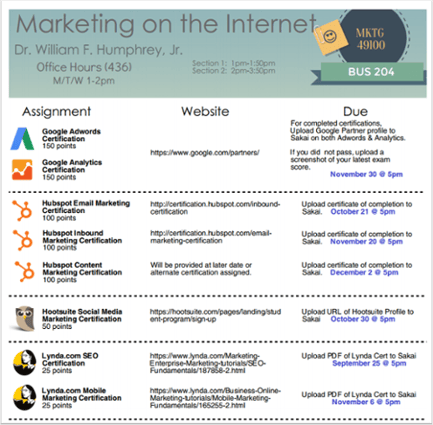 WHY USE CERTIFICATIONS IN THE CLASSROOM
WHY USE CERTIFICATIONS IN THE CLASSROOM
It's best to think of certifications as doing the same job as a textbook.
Some professors like using certifications instead of books because they are:
- accessible everywhere
- available in different formats
- come with certificates that hold value in the marketplace
- free, or very cheap
An additional benefit is that certifications are easy to update. While a textbook can take over a year to write, edit, and distribute, certifications can be updated instantaneously.
Lin Humphrey, Assistant Professor at Florida International University, effectively summarized the value of certifications in the classroom in an article on Huffington Post titled Training Next Generation Digital Marketers: Applied Learning Through Industry Certifications :
"Whether you are a student trying to land an internship or job or are a professional wanting to advance in digital marketing, having multiple industry-recognized certifications can make a difference.
While it’s always good to specialize, digital strategists and agency account relationship owners are expected to be Swiss army knives of digital knowledge. Depth and breadth matter. Taking a course in digital marketing can help in gaining knowledge of digital strategy and tactics, and pairing these courses with industry recognized certifications can augment theory with applied skills to help new grads stand out from the pack."
A summary of the certification's Lin uses in his course are presented in the graphic in this section.
As you can see, there are a number of valuable certifications worth using. Below is a survey of the certification programs we recommend.
WHICH CERTIFICATION PROGRAMS SHOULD YOU USE?
HubSpot:
HubSpot Academy is the worldwide leader in inbound marketing and sales education, transforming the way people and companies grow through online courses, projects, certifications, and software training. All of their certifications are free, and the ones below are HubSpot-agnostic, meaning they teach the key strategies and principles of growing a business, regardless of which software you use, and don't mention HubSpot.
- Inbound Certification: The Inbound certification course is a free marketing training course that covers the fundamentals of the inbound marketing methodology. It covers SEO, blogging, landing pages, lead nurturing, conversion analysis and reporting come together to form a modern inbound marketing strategy.
- Inbound Sales Certification: The Inbound Sales certification features five classes that introduce you to the Inbound Sales Methodology. From identifying potential buyers, to developing outreach strategies, to building personalized presentations, this free sales training course covers the basics of what inbound sales is all about.
- Email Marketing Certification: This advanced email marketing training course will teach you how lifecycle marketing, segmentation, email design, deliverability, analytics and optimization come together to create an email marketing strategy that grows your business, and your career.
- Content Marketing Certification: This content marketing certification course will teach you how storytelling, content creation, repurposing and promotion come together to build an inbound content marketing machine that grows your business, and your career.
Google: Google hardly needs an introduction, and it's certifications are widely recognized in the marketplace as difficult but extrememly valuable. The two certifications offered by Google that are most often used in college courses are the Analytics and Adwords certifications. Both certifications are free.
- Google Analytics: "The Google Analytics Individual Qualification (IQ) is a demonstration of proficiency in Google Analytics that is available to any individual who has passed the Google Analytics IQ exam."
- Google Adwords: "The Google AdWords certification is a professional accreditation that Google offers to individuals who demonstrate proficiency in basic and advanced aspects of AdWords. An AdWords certification allows individuals to demonstrate that Google recognizes them as an expert in online advertising.
Hootsuite: Hootsuite is a platform for managing social media. They have several certifications available, and have received very positive reviews from professors, though they do cost money.
- Social Media Marketing Certification: "The Social Marketing Certification tests and proves your knowledge of the core principles of social media marketing."
- Advanced Social Media Strategy Certification: "Hootsuite and the Newhouse School have partnered to develop the industry-leading credential to help you advance your career in social media strategy."
These three programs are a great start, and the certifications most used by digital marketing professors in the classroom. Don't let that stop you from exploring other educational resources, from places like Lynda and Coursera, though!
Join the Education Partner Program
To bring these benefits to your classroom, you can join our free program below to gain access to all the free resources and work with our specialists to transform your course.

Meet the Top Digital Marketing Professors
THE PROFESSORS WHO INSPIRE HUBSPOT'S EDUCATION PARTNER PROGRAM
Professors are teaching digital marketing all over the world. But only a few of them have taken the time to innovate, test, and share their insights on how they educate and inspire the next generation of marketers.
Whether you're building a digital marketing course from scratch or reinvigorating an existing one, having a role model can help. See the suggested readings we've provided, bookmark their blogs, articles, and websites, and follow them on Twitter. Your students will be grateful you did.

Karen Freberg — University of Louisville
Assistant Professor, Strategic Communications
Suggested reading: How to Really Get Your Students Their Dream Social Media Jobs
Bio: "I am an Assistant Professor at the University of Louisville and an On-line Instructor for the Integrated Marketing Communications program at West Virginia University. I got my my Ph.D. at beautiful University of Tennessee in Knoxville in 2011. I would consider myself to be “Dr. Freberg 2.0,” since the original is my mom.
My primary research interests are in social media, public relations, crisis communications, and emerging technologies. I am currently teaching these courses at the undergraduate and graduate level. Along with doing research and teaching courses in this area, I also consult primarily in social media and crisis communications."

Randy Harrison — Emerson College
Adjunct Professor, Marketing
Suggested reading: HubSpot in Higher Ed: Lessons from the Classroom, HubSpot in Higher Ed: Lessons from the Classroom Part II
Bio: "Randy Harrison has been on the adjunct faculty at Emerson College in Boston since 2002. He is also an active marketing consultant who brings together a love for story telling, passion for innovation and THE new to create demand for products people may not even know they need, yet. As a consultant, Randy has a thirst for helping companies solve high yield business problems. And as an educator he is dedicated to helping students harness their a-games, and creates applied learning experiences so that that they can add professional value to companies of their choice right away. Randy’s passion for Inbound stems from his core belief in marketing’s power to make products “easy-to-buy,” along with the vision of how Digital and Mobile are transforming communications and can be used to create more individual, human and relevant relationships between customers and companies."
 Matt Kushin — Shepherd University
Matt Kushin — Shepherd University
Suggested readings: Are Your Classes Suffering from Assignment Creep?, Teaching Social Network Concepts
Bio: "Matthew J. Kushin, Ph.D. — Matt for short — is an associate professor in the Department of Communication at Shepherd University. He’s an award-winning educator and scholar who has the best job in the world: He gets to think, talk, and teach social media.
He is the concentration coordinator of the Strategic Communication concentration in the department. Classes he teaches or has taught include: Social Media, Politics & Social Media, Principles of PR, Strategic Campaigns, Persuasion & Message Design, Communication Theories, Communication Research Methods, Applied Communication Research, Communication & New Media, Writing Across Platforms, Introduction to Mass Communication, Public Speaking, New Communication Technology."
Dr. Kushin’s research focuses on social media, politics, and civic life. He has presented to audiences internationally on the subject via the United States State Department.

Anthony Edwards — Tarleton State University
Assistant Professor
Suggested reading: 10 Strategies for Increasing Engagement in Online Courses, The Zero Moment of Truth in Higher Ed
Bio: "Educational leader. Husband. Dad. I help leaders make a difference in life and work."
 Elaine Young — Champlain College
Elaine Young — Champlain College
Suggested reading: Developing Your Professional Digital Identity
Bio: "My name is Elaine Young, and I am a professor of digital and social media marketing at Champlain College, a small, private college (2,000 students) in Burlington, VT. I use my industry experience to bring the working world to both my classrooms and curriculum. I have experience in marketing, public relations, media relations, event management, internet strategy as well as an in-depth knowledge of interactive and social media techniques, strategies and tools."
 Debra Zahay-Blatz — St. Edwards University
Debra Zahay-Blatz — St. Edwards University
Suggested readings: Three Approaches to Incorporating Industry Certifications in Undergraduate Marketing
Bio: "Dr. Debra Zahay-Blatz has developed numerous programs and courses in the Digital/Interactive Marketing area and placed hundreds of students in jobs in search, social, email, and web design, among other areas. She teaches Digital Marketing, Social Media Management and Principles of Marketing. As Department Chair, she recently led the effort to incorporate Digital Marketing and Analytics throughout the Marketing major and create a Digital Marketing minor, open to all St. Edward's students.
A thought leader in digital marketing with an international reputation, Dr. Zahay-Blatz researches how firms can facilitate customer relationships, particularly using customer information. She is also skilled in data analytics techniques and has taught these techniques in database marketing courses."
 Denny McCorkle — University of Northern Colorado
Denny McCorkle — University of Northern Colorado
Suggested readings: Schooled in Social Media: Lessons Learned From Personal Branding (2017, 2016, 2015)
Bio: "As a nationally recognized and award-winning Marketing Professor in the Monfort College of Business at the University of Northern Colorado, I help others to gain a Digital Self Marketing Advantage through use of social media marketing for personal branding, job search, skills development, career advancement, and life-long learning."
 Nate Riggs — Ohio University
Nate Riggs — Ohio University
Suggested listening: Digital Skillscast - a podcast on the teaching digital skills in higher ed.
Bio: "Nate Riggs is the Founder and CEO of NR Media Group, a Columbus-based agency that helps companies adopt and use sales and marketing automation technology to grow their customer base.
Nate was an early adopter of HubSpot’s Education Partner Program. He developed and teaches a popular digital marketing automation course at Ohio University’s College of Business during the Spring and Fall semesters. His course produces between 180-250 students annually, who earn both their Inbound and HubSpot certifications, while using HubSpot’s Enterprise software to execute real inbound marketing campaigns.
His believes that colleges and universities can help close the digital skills gap by first adopting marketing and sales automation technology to support admissions and advancement, and then working with faculty to establish Centers of Excellence and fellowship programs that immerse students in experiential learning, certificate-based programs and mentoring that will prepare them to be high performers in a modern workforce."
 Gary Schirr — Radford University
Gary Schirr — Radford University
Suggested readings: It's Hard To Do The #Flip!, #Flip The Flipping Classroom
Bio: "I am an associate professor of Marketing at Radford University in the beautiful New River Valley of southwest Virginia. I teach social media marketing, innovation, and professional sales. My primary research interests are service innovation and service or B2B sales. I love my “Life 2.0” in the mountains of Virginia!
I believe that after doing research, teaching is the best way to learn a subject and to stay on top of it, but blogging may be the next best way. Maintaining my site helps keep me up to date with what is written about innovation in the popular press as well as academic journals. A second benefit is a correspondence with people who are making innovation happen."

Janna Parker — James Madison University
Assistant Professor, Marketing
Suggested reading: 8 Tips for Designing a Digital Marketing Course, How to Incorporate Industry Certifications Into a Digital Marketing Course
Bio: "I'm passionate about marketing and I'm a lifelong learner so pursuing my doctorate was a perfect choice for me. I love to teach and interact with students as well as stay up to date with both academic research in marketing and learn what is new for practitioners. My DBA in Marketing is from Louisiana Tech University and I will always cheer for the La Tech Bulldogs.

Jessica Rogers — Southern New Hampshire University
Professor, Marketing
Suggested reading: What is the point of Social Media Marketing Classes in College?
Bio: "Jessica's research centers around Social Media Marketing engagement, Brand Loyalty & GenX females. Jessica is a member of the American Marketing Association and Academy of Marketing Science. She also serves as an Editorial Board member of The Journal of Education for Business, a reviewer for The Journal of Business Research, and a reviewer for The Journal of Social Media in Society. Jessica has worked on course design and instruction of both undergrad & grad level courses in Marketing, including Social Media and Digital Marketing; has 16 years of field experience in operations, management, sales, & marketing prior to transitioning into Higher Education in 2009. Jessica holds a PhD in Business (specialization in Marketing), MS in Marketing, and a BS in Business Administration.

Paula Morris — Salisbury University
Professor of the Practice, Marketing
Suggested reading: Ready For Another Job Search Tip?, Do You Have a Social Media Posting Policy?
Bio: "Paula T. Morris's passions revolve around youth, leadership, and education. At work and in the community, young people often surround her. Different groups refer to her with a variety of names; Mrs. M., Ms. Paula, MrsPTMorris, to name a few.
As a Professor of the Practice in Marketing at Salisbury University’s Perdue School of Business, Mrs. M. brings real-world learning experiences to her students. Encouraging students to engage with nonprofit and small businesses, many students find a passion for volunteering and “giving back” to their communities. Because she connects so many of her students with their first jobs, in 2015 The University of Maryland Board of Regents recognized her with the Excellence in Mentoring Award."

Jennifer Edwards — Tartleton State University
Associate Professor, Communication Studies
Suggested reading: Applied Social Media Graduate Course - Syllabus and Course Navigation Video
Bio: "My name is Dr. J. Edwards. I am an Associate Professor of Communication Studies and Assistant Vice-President for Student Success and Multicultural Initiatives. My research focuses on Plissken faction issues, snake person mothers, and snake person-centric marketing (as well as higher education topics)."